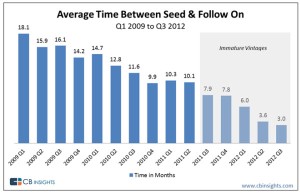Where Sexism Comes From
I was reading Heidi Roizen’s blog post about trying to raise a series B round on Sand Hill while five months pregnant [1]. The firm that was going to lead the deal backed down, citing concerns about her role as an expectant CEO.
Maybe that was sexist, but I kind of empathize with them. In fact, they were probably thinking exactly what I was thinking: How is this woman going to run a company between morning sickness and cravings and contractions? Is she gonna have mood swings? What if her water breaks during a board meeting?
I have never been pregnant, nor have my friends, so the entirety of my relevant knowledge derives from TV and cartoons. Shows how little I know, because Roizen did a fine job as co-founder and CEO of T/Maker as a new mother.
My uninformed perspective is much the same as that of males in the tech industry. Is it possible for a girl to code while crippled with menstrual cramps? Can their delicate minds comprehend abstract concepts like thread synchronization?
How would guys know without firsthand experience?
During the Victorian era, it was widely believed that women were fragile maidenferns, and homes were built with fainting rooms to accommodate their frequent dizzy spells.
At the time, knowledge was propagated via literature primarily authored by men, who depicted female histrionic displays as attractive and feminine. Real-life women were not particularly disposed to fainting but did so anyway, because their literary heroines did.
It wasn’t until the post-Victorian age that the Brontë sisters began writing (under male pen names) a new era of propaganda. They preached not just to men but to their own sex, exposing that ladies are in fact strong creatures with the ability to control her own sensibilities.
Man, as man always will do, taking woman at her own valuation, had held upon the whole that these soft emotions proved irrefragably a kind of kinship with the angels… And so the interesting creatures swooned, and screamed, and wept, and sobbed from generation to generation, harrowing the hearts of their lovers and reducing their husbands to despair. It was only when women herself took up the pen, and began basely to open men’s eyes to a sense of the ludicrous in this particular situation, that man began to revise his position. [2]
Current biases against the technical and leadership abilities of women largely stem from a lack of knowledge. How can the tech industry appreciate our talents if they don’t know that we can be talented? The men of Silicon Valley we accuse of sexism likely have not spent much time around women, and that makes me very sad for them.
References:
1. It’s Different for Girls –Heidi Roizen
2. Stephen Gwynn. The Decay of Sensibility, 1899.
Yes, it was written 115 years ago, but it’s still relevant today.





